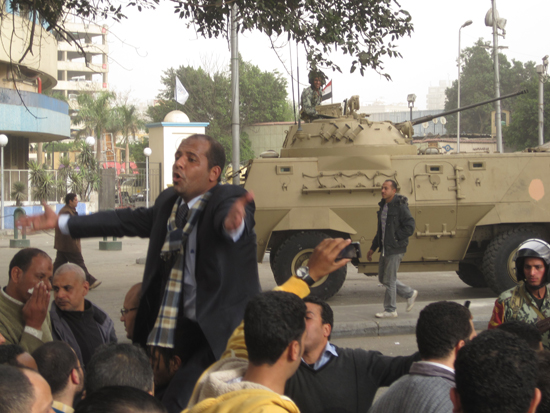Istanbul, Turkey -- Following massive protests yesterday in Cairo's Tahrir Square -- the largest since unrest erupted more than a week ago -- President Hosni Mubarak announced that he would not seek reelection later this year. As those who remain in the streets well know, this was hardly a concession since the 82-year-old Mubarak, who is reportedly ailing and recently underwent gallbladder surgery, is very likely nearing the end of his reign anyway. The move, which dovetails nicely with the White House's stated policy of ensuring an "orderly transition," was intended to accomplish one thing: buy time for Mubarak to pass the baton to someone within the regime's old guard.
Although it is looking increasingly unlikely that the man tapped will be Mubarak's son, Gamal, it could very well be someone like Omar Suleiman, the former intelligence chief, long-time Mubarak confidant, and recently appointed vice president. Indeed, since people began pouring into the streets a week ago to call for an end to decades of unemployment, corruption, and police brutality at the hands of Mubarak's National Democratic Party (NDP), the aging president has shown a remarkable unwillingness to compromise. In addition to flooding the streets with tanks and calling on the Air Force for fighter jet fly-overs of the capital city, Mubarak has repeatedly stated that his chief priority is the "security" of the people, an obvious euphemism for continued authoritarian rule.
Mubarak's inability to see the uprising as anything other than the petulance of unruly and short-sighted subjects shone through yet again in yesterday's address to the Egyptian people; he accused protestors of adding "fuel to the fire," stating further that "The events of the past few days impose on us, both citizens and leadership, the choice between chaos and stability." That he has elected to "finish [his] work for the nation" is just one more indicator that he has not taken seriously the demands of the people.
For his part, President Obama seems content with the apparent compromise, saying that an "orderly transition must be meaningful, it must be peaceful, and it must begin now," but never explicitly challenging Mubarak's decision to remain in power. Here, the choice of phrasing, which the New York Times called "deliberately vague," is significant in and of itself. Although clearly intended to convey a sense of urgency, its lack of precise meaning cannot help but call to mind another infamously nebulous phrase: "all deliberate speed." Like the Supreme Court's ruling in Brown v. Board of Education, Obama's words fail to establish a standard upon which they can be judged. What does it mean for a transition to be "meaningful"? Can it be accomplished with Mubarak in place? One of his surrogates? Who is to say?
For the people rallying in the streets of Cairo, the statements by Mubarak and Obama may have underscored the difficulty of pressing for change in a world dominated by U.S. oil and security interests. It is, after all, the U.S.'s fear of what would happen if the Muslim Brotherhood, Egypt's largest opposition group, were to gain power that prevented us from pressuring Mubarak to engage in gradual reform long, long ago. That we are on the brink of collapse today is largely the result of that calculation. Yet there is one positive development born of yesterday's events that has gone largely unnoticed. The word "democracy" -- apparently made poisonous by its association with the Bush Administration -- has once again entered the presidential lexicon. As Obama said, "going forward, the United States will continue to stand up for democracy and the universal rights that all human beings deserve." Modest, yes, but progress nonetheless.
